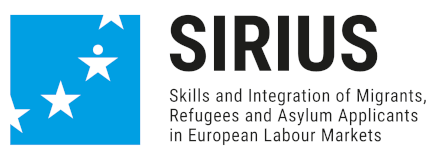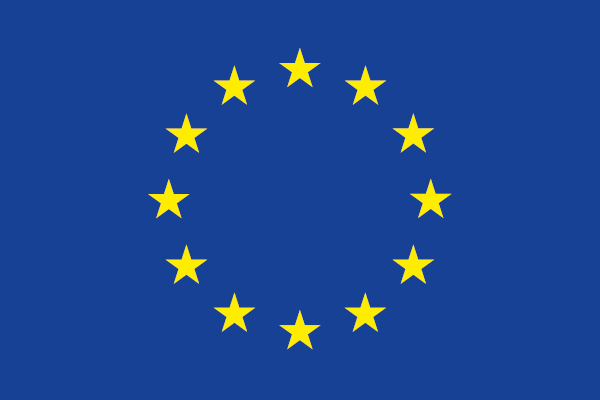WP Reports and Results
SIRIUS FIRST OPEN ACCESS SPRINGER/IMISCOE SERIES BOOK AVAILABLE FOR FREE DOWNLOAD
Veronica Federico and Simone Baglioni
The Sirius first open access book entitled 'Migrants, Refugees, and Asylum Seekers' Integration in European Labour Markets. A Comparative Approach on Legal Barriers and Enablers' discusses how, and to what extent, the legal and institutional regimes and the socio-cultural environments of a range of European countries (the Czech Republic, Denmark, Finland, Greece, Italy, Switzerland and the UK), in the framework of EU laws and policies, have a beneficial or negative impact on the effective capacity of these countries to integrate migrants, refugees and asylum seekers into their labour markets. The analysis builds on the understanding of socio-cultural, institutional and legal factors as “barriers” or “enablers”; elements that may facilitate or obstruct the integration processes. The book examines the two dimensions of integration being access to the labour market (which, translated into a rights language means the right to work) with its corollaries (recognition of qualifications, vocational training, etc.), and non-discriminatory working conditions (which, translated into a rights language means right to both formal and substantial equality) and its corollaries of benefits and duties deriving from joining the labour market. It thereby offers a novel approach to labour market integration and migration/asylum issues given its focus on legal aspects, which includes most recent policy changes and legal decisions (including litigation cases). The robust, evidence-based and comparative research illustrated in the book provides academics and students, but also practitioners and policy makers, with up to date knowledge that will likely impact positively on policy changes needed to better address integration conundrums.
Link: Sirius Open Access Book Link for Free download
SIRIUS: LESSONS LEARNED AND BEST PRACTICES REPORT (WP7 REPORT)
Maria Mexi
The Sirius project has issued its 'Lessons Learned and Best Practices' report which highlights key findings about barriers and enablers of labour market integration of migrants, refugees and asylum seekers in the seven countries studied in the project: the Czech Republic, Denmark, Finland, Greece, Italy, Switzerland and the United Kingdom.
The report, written by Sirius team member Dr Maria Mexi, at the University of Geneva, unveils how factors located at three levels of analysis, macro (policy), meso (social partners and civil society) and micro (individual agency), combine to obstruct or support newcomers' integration in European labour markets.
Attachments![]() Labour Market Integration of Migrants, Refugees and Asylum Seekers: Lessons Learned and Best Practices
Labour Market Integration of Migrants, Refugees and Asylum Seekers: Lessons Learned and Best Practices
WP6 REPORT - INDIVIDUAL BARRIERS AND ENABLERS
Simone Baglioni and Irina Isaakyan
SIRIUS is issuing a new research report titled “Individual enablers and barriers in labour market integration of migrants, refugees and asylum seekers in Europe” analysing migrants’ insights into barriers and enablers they experienced when entering our labour markets. Delving into everyday experiences of a range of migrants, and hearing their own voices we discuss how newcomers exercise agency to seize opportunities offered by their country of settlement and mitigate the effect of the turbulent social, political and economic circumstances they often meet with. Our micro-level research takes a closer look at the needs of migrants, with a specific focus on what migrants themselves consider to be barriers for and enablers of integration.
To understand migrants’ capabilities and agency, we do not only look at their lives over the last five years but also explore their more distant memories long before their migration. Analysis of their past experiences enables our better understanding of their motivation for emigration, of barriers and opportunities they were facing and of their individual capacity for change and resistance. Looking back into their past also enables us to explore in-depth the reciprocal relationship between their agency and the socio-cultural context. The analytical accent is specifically placed on the turning points and emerging epiphanies of migrants’ lives. We mostly emphasize the narrative thematic analysis (composite biographies) and its combination with data from other levels of inquiry, or cross-level analysis. At the same time, we also include individual biographies and ethno-dramatic representations (two or three dynamic migrant-tales and a short ethno-theatrical text from national team) as analytical additions to and illuminations of our emerging narrative-biographic themes.
Attachments![]() Individual Barriers and Enablers
Individual Barriers and Enablers
WP5 REPORT - SOCIAL PARTNERS ENABLERS AND BARRIERS
Simone Baglioni and Thomas Montgomery
This report details the findings of the role that social partners and social dialogue can play enabling or not the integration of migrants, refugees and asylum seekers in the European labour market. Social partners play a key role in labour market dynamics as they contribute towards determining the policy and legal frameworks that shape labour markets, but also the social, political and economic trends in which labour markets are embedded. Therefore, an examination of social partners’ understanding of the newcomers’ capacities and their appreciation of opportunities and challenges to be addressed is unavoidable in any research willing to understand how to facilitate unlocking the employment potential of migrants, refugees and asylum applicants. This study presents findings from a four-month long process of field work of interviews with social partners (gathering overall 123 interviews) complemented by an experts’ survey which managed to collect responses from 293 additional social partners’ representatives across our seven countries (Czech Republic, Denmark, Greece, Finland, Italy, Switzerland and the UK).
The experts’ responses reveal that some of the key issues that had been discussed by extant studies, and in particular the dilemmas faced by unions vis-a’-vis migrants (e.g. if they are to include them among their beneficiaries and members, how to mitigate the potential competitive spirals newcomers bring in the receiving society labour markets, how to avoid social/wage dumping, etc..) are still relevant. Our data also show the social partners’ awareness about the higher (than local workers) risks migrants incur for their health and safety due to the poor regulations of migration and asylum which often confine newcomers to employment in the irregular economy, or to jobs requiring lower skills, leading to wasted talent, demotivation, and potential social isolation. However, our study also reveals the appreciation that social partners have of newcomers’ skills, of their potential for the wellbeing of our societies and economies, a potential which very often remains unrealised. This is due to reasons that are at a time pertinent to our society’s regulation of migration (migration and asylum law, recognition of skills and educational attainment levels, services to improve newcomers’ capacities to adapt to our labour markets, etc..) and a time connected with the characteristics of the migrants themselves (language proficiency, social capital, personal well-being and health). Such results are fully consistent with the analyses we have carried out in previous work packages, providing us with robust (triangulated) evidence about the further efforts policy makers, but social partners too, should engage in.
What we can take from this analysis of social partners is the need for both policy makers at various levels of government and social partners to commit to create further social dialogue opportunities. Too few cases of social dialogue have occurred across our seven countries in the field of labour migration, but social dialogue seems to us a (if not the) fundamental tool to solve problems occurring in such a polarized domain of migration, and in what is even a more contentious one, that of labour migration. Rather than leaving space to single-actor claims and activities, even when these are very positive in problem solving –see our country reports in the following sections for examples about how unions and employers solve problems in labour migration—we should encourage a more coordinated multi-actor effort based on dialogue and mutual understanding, as represented by social dialogue.
Attachments![]() Social Partners Enablers and Barriers
Social Partners Enablers and Barriers
WP4 REPORT - CIVIL SOCIETY ENABLERS AND BARRIERS
Dino Numerato, Karel Čada, Karina Hoření - Charles University
This report details the findings of the fourth SIRIUS work package, focusing on the role of civil society organisations (CSOs) in the labour market integration (LMI) of MRAs. Our report examines the positions of CSOs and their perception by MRAs in the SIRIUS partner countries, namely the Czech Republic, Denmark, Greece, Finland, Italy, Switzerland, and the United Kingdom, and thus our findings reflect experiences across a wide variety of different national contexts. Our findings suggest that CSOs can work as important actors enhancing not only integration into the labour market but also integration through the labour market. CSOs are important language course providers, and thanks to their social, legal, and administrative guidance, CSOs help MRAs in overcoming ineffective administrative and legal structures. These activities are provided by the majority of CSOs across SIRIUS countries. Several CSOs in these countries also assist MRAs with the recruitment process, providing courses and advice on how to prepare for an interview, how to write a CV, or how to draft a cover letter. Furthermore, CSOs also assist MRAs in their efforts to have their skills and qualifications recognised. Moreover, by providing mentorship, training programmes, volunteering, or even direct employment, CSOs contribute to the development of MRAs’ skills and competencies and provide platforms to enhance the agency and autonomy of MRAs. However, such a capacity is unevenly spatially distributed, it is rather rare in the Czech Republic and Denmark, it is somewhat developed in the United Kingdom, and more strongly developed in Finland, some areas of Italy, among the solidarity movement organisations of Greece, and in the Canton of Geneva in Switzerland. Moreover, CSOs either individually or collectively, frequently raise the problematic situation of illegal practices on the part of employers, exploitation, human trafficking, or underpaid wages. Last but not the least, CSOs help to mitigate and, often together with MRAs, struggle against the hostile context of a widespread atmosphere of xenophobia.
Attachments![]() Civil society enablers and barriers
Civil society enablers and barriers
WP3 REPORT - POLICY BARRIERS AND ENABLERS
Ilona Bontenbal, Nathan Lillie - University of Jyväskylä
This report details the findings of the third SIRIUS work package, focusing on migrant labour market integration (MLI) policies and services. The objectives of migrant labour market integration (hereinafter MLI) policies are 1) helping migrants to overcome handicaps and skill deficits to better succeed in host country labour markets 2) better matching migrants’ characteristics to employer needs by, for example, training them or guiding them to labour shortage occupations. Our report covers policies in the SIRIUS partner countries, namely the Czech Republic, Denmark, Greece, Finland, Italy, Switzerland, and the United Kingdom, and thus we present a wide variety of different national contexts. In addition, we also detail European Union specific policies and programmes.
The research of this work package was divided into two main tasks which are a) policy discourse analysis and b) assessment of existing policies and their outcomes. A policy discourse analysis was conducted by the SIRIUS national teams, to identify and analyse how issues of labour market integration are discussed by policy-makers and policy actors. By analysing the findings of the discourse analysis together with the assessment of policies, which forms the second part of the work package, we evaluate the consistency between policy rhetoric and policy goals. The second part of the work package consists of a policy assessment in which the barriers to labour market integration and existing policies to remedy them are identified, categorised and evaluated. This was performed using a meta-analysis of the existing national literatures, and interviews with policy experts, implementers, and beneficiaries of MLI policies.
Attachments![]() Policy Barriers and Enablers
Policy Barriers and Enablers
WP2 REPORT - LEGAL BARRIERS AND ENABLERS
Veronica Federico - University of Florence
This report assesses how far legal frameworks of migration and asylum work as enablers or obstructers of non-EU migrants, refugees and asylum applicants’ (MRAAs) integration in European labour markets across the seven countries studied in SIRIUS (the Czech Republic, Denmark, Finland, Greece, Italy, Switzerland, and the United Kingdom). To fulfil such a main objective, the work has been organised in three principal streams of activities: (1) gathering and critically analysing information on the political, legal and institutional context of migration governance, and illustrating national cases through country reports, and the EU framework legislation in the EU report; (2) comparing the national case-studies and discussing the outcome in a comparative report; and (3) retrieving and systematizing a number of indicators available in the most relevant databases in order to create an ad hoc dataset on socio-economic, cultural, political and legal indicators on migration covering all SIRIUS countries. This report is the product of the first two streams of activities. When legal issues are at stake, MRAAs integration heavily depends from the country they settle in and from the legal status that is recognized to them. In fact, entry and settlement in European countries is subject to strict limitations to non-EU nationals, but such limitations take different shades according to a given European country and a given migrant status.
Attachments![]() Legal Barriers and Enablers
Legal Barriers and Enablers
WP2 - COMPARATIVE DATASET ON SOCIO-CULTURAL, POLITICAL AND LEGAL INDICATORS
Nicola Maggini
The purpose of the database is to provide information of the legal, socio-cultural, political context of Europe at times of refugee crisis. In particular, the comparative database includes a systematic set of indicators measuring the macro-level conditions under which legal frameworks and measures are most effective to integrate migrants, refugees, asylums seekers post-2014 (MRAs) into the labour market of European countries. The database draws on data spanning the time period 2010-2017 and covers 7 countries: Czech Republic, Denmark, Finland, Greece, Italy, Switzerland and UK. We gathered systematic comparative data on: social conditions (e.g. income inequalities, state expenditures for labour market, union membership and density, employment protection, childcare, etc.) using existing sources (e.g., Eurostat, OECD); political, institutional and legal features (e.g. configuration of power, party polarization, the structure of the state and the decentralisation process, fundamental rights, political discrimination of minority groups, etc.) using existing sources (e.g., the Comparative Political Data Set at the University of Bern, Democracy Barometer); citizens’ subjective attitudes and behaviours (e.g. social and political attitudes, social and political behaviours, social life) using existing comparative surveys (e.g., the European Social Survey, Democracy Barometer, IPSOS and the Eurobarometer’s surveys). This data set is suited for cross-national, longitudinal and pooled time series analyses.
Attachments![]() Socio-Cultural, Political and Legal Indicators - Dataset
Socio-Cultural, Political and Legal Indicators - Dataset![]() Socio-Cultural, Political and Legal Indicators - Codebook
Socio-Cultural, Political and Legal Indicators - Codebook
WP1 REPORT - EMPLOYABILITY OF MRAS IN THE SIRIUS COUNTRY
Athena Belegri-Roboli, Panayotis G.Michaelides, Konstantinos N. Konstantakis, Maria Markaki, Theocharis Marinos - National Technical University of Athens
The first part of this report aims at identifying the SIRIUS economies and the sectors of economic activity that could be considered as being “labour absorbing”, using aggregate national data for the time period 2008-2016. Econometrically, in order to take into consideration the complex labour dynamics among the various SIRIUS economies as well as the potential spillover effects among the various countries, this report employed a GVAR model for all the economies. In this context, using the GVAR framework, the dynamic interlinkages and the potential spillover effects among the various SIRIUS economies will be uncovered. The implicit assumption, in this framework, is that there is labour mobility among the various economies. Therefore, the results of the GVAR estimation pinpointed the labour absorbing economies in the dataset. At the second step, this report analysed the labour absorbing sectors in the SIRIUS economies. A labour absorbing sector, identified in the second step, implies that this specific sector could attract, independently, more labour from the rest of the sectors in order to increase its production.
The estimation of the sectoral VAR/VEC models in the second step was conducted using sectoral data for the economies of Switzerland (CH), the Czech Republic (CZ), Finland (FI) and the United Kingdom (UK), Greece (GR), Denmark (DK) and Italy (IT), that cover the four main sectors of economic activity, i.e. Primary sector (A, Nace Rev.2), Secondary sector (B-F, Nace Rev.2), Manufacturing sector (C, Nace Rev.2), and tertiary sector (G-U, Nace Rev.2), that capture each sector’s output (Y) and Labour (L), were employed.
Attachments![]() Employment Opportunities
Employment Opportunities
WP1 REPORT - LABOUR MARKET BARRIERS AND ENABLERS
Athena Belegri-Roboli, Panayotis G.Michaelides, Konstantinos N. Konstantakis, Maria Markaki, Theocharis Marinos - National Technical University of Athens
The main aim of this report was to conduct a comparative statistical analysis of the SIRIUS database - in order to determine: i) the position of post-2014 migrants, refugees and asylum seekers (MRAs) in the labour market of their host country and ii) the main features of the host countries’ labour markets focusing on the sectoral structure and the relevant skills and occupations. In this context, the particular goals of the report are the investigation of: (a) the MRAs flows for the SIRIUS countries and the MRAs’ integration opportunities into the corresponding labour markets; (b) the SIRIUS countries labour markets’ sectoral and occupational specialisation, and (c) the labour market determinants.To this end, the MRAs position and the labour market’s analysis is conducted at the country level, followed by a comparative report. Probabilistic Panel Data models have been employed to econometrically investigate how the flows of MRAs affect their employment opportunities in the labour market. Furthermore, Dynamic Panel Data analysis has been undertaken to investigate the determinants of labour market dynamics for each economy.
The analyses of labour markets and economic infrastructure in the selected seven countries in the SIRIUS project highlight the relevance of three main factors that should be considered when developing strategies for the labour market integration of migrants, refugees, and asylum seekers. Firstly, there is the unevenness of types of economies and labour markets among European countries, secondly they host MRAs with different educational attainments and capacities, and, thirdly the asymmetric effect of the 2008 global financial crisis and its consequences for each of the eight countries that are the focus of our research.
Attachments![]() Labour Market Barriers and Enablers
Labour Market Barriers and Enablers


